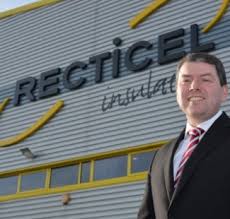Recticel Insulation and the Sustainable Energy Association (SEA) are pleased to announce that Recticel has joined the Association as an Executive Member.
Recticel Insulation is based in Stoke-on-Trent, where they produce polyisocyanurate (PIR) products which are used in the UK and internationally to insulate homes and workplaces. Recticel employs over 500 people in the UK. The business joins a number of its commercial peers within the SEA family adding to the trade association’s reputation as the leading voice promoting a buildings-led, fabric-first approach to meeting the UK’s energy needs, where properly insulated and airtight buildings are heated and powered by the most appropriate low carbon and renewable energy means.
 Kevin Bohea, Commercial Director for Recticel Insulation, said
Kevin Bohea, Commercial Director for Recticel Insulation, said
“We are delighted to join the SEA at a critical time for the sector. Energy efficiency has long been recognised as the most cost effective way to meet all the goals of energy policy, and the recent political events in the UK mark a near-unique opportunity to establish a new way forward for the insulation market in particular. We have watched the SEA develop in recent years to become one of the most effective and constructive voices for a fabric-first approach to energy policy, and are pleased to join this influential organisation to help shape the UK market for the future”.
 Ed Bannock, the SEA’s Vice President, said
Ed Bannock, the SEA’s Vice President, said
“We are delighted to welcome Recticel Insulation to the ranks of our Executive Members. The need for well insulated buildings, heated and powered by cost effective, low carbon sources, has long been at the heart of the SEA’s core message. Recticel Insulation’s joining the SEA adds another important and significant insulation manufacturer to our Executive Membership at a critical time in policy development. We look forward to working with Recticel as we work constructively with Government to develop new policies to boost the markets for all types of building-level low carbon products and services”.
–ENDS–